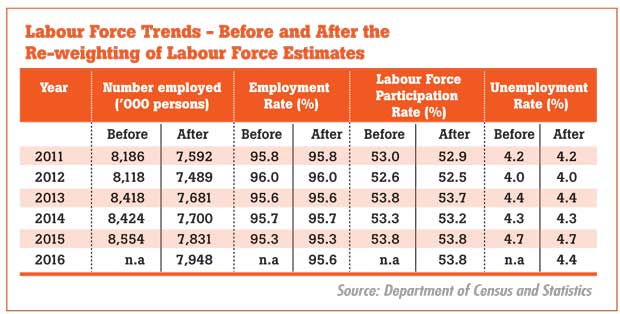06 Nov 2017 - {{hitsCtrl.values.hits}}

The Central Bank of Sri Lanka last week noted that the employment statistics compiled by the Census and Statistics Department (DCS) had undergone a revision in 2016, in the process reminding policy commentators not to compare the old statistics with the re-weighed figures.
There had been backlash against the recent public comments of both Prime Minister Ranil Wickremesinghe and National Policies and Economic Affairs Deputy Minister Dr. Harsha de Silva that 430,000 new jobs were formed between the first quarter of 2015 (1Q15) when their government took office, and the first quarter of 2017 (1Q17).
Those criticizing the two politicians had referred to employment statistics present in the Annual Reports of the Central Bank, where employment figures, which had been as high as 8.55 million as reported in the Central Bank Annual Report 2015, fell to 7.95 million recorded in the Central Bank Annual Report 2016.
Some policy commentators had criticized the politicians for quoting seemingly incorrect figures, as well as the accuracy and credibility of employment statistical reports.
However, the Central Bank Annual Report 2016 had recorded the figures re-weighed by the DCS, which was mentioned in the publication, while the Central Bank Annual Report 2015 had displayed the older figures.
“In July 2016, the Labour Force Survey estimates were re-weighted by the DCS and a new series was published for data pertaining to the years from 2011 onwards. This is the general practice in all other countries and it maintains the consistency of LFS estimates with the revised Mid-Year Population Estimates,” the Central Bank said.
Despite the revision, the DCS had noted that there was no difference in the pattern of employment statistics.
Under the re-weighed statistics, 7.80 million were employed in 1Q15, which increased to 8.23 million employed in 1Q17, indicating that Wickremesinghe and Dr. de Silva were quoting to these reweighed statistics when speaking of 430,000 new jobs being created under their government.
The employment figures are important for this government which promised to create 1 million new jobs by the end of its mandate in 2020.
Most of the jobs created between 1Q15 and 1Q17 were in industrial and service sectors, while a major decline was seen in employment in the agriculture sector, which absorbs around a quarter of the country’s employment, but contributes just 7 percent to the country’s Gross Domestic Product.
28 Sep 2024 7 minute ago
28 Sep 2024 16 minute ago
28 Sep 2024 2 hours ago
28 Sep 2024 4 hours ago
28 Sep 2024 5 hours ago